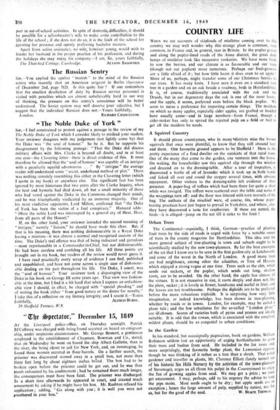The Noble. Duke of York "
able view I should, in effect, be charged with " special pleading " and of writing the book either " from good nature or the desire for novelty." I take this ai a reflection on my literary integrity, and I resent it.—Yours Sue,—I feel constrained to protest against a passage in-the review of my The Noble Duke of York which I consider likely to mislead your readers. Your reviewer disagrees with my judgement (not lightly come by) that the Duke was " the soul of honour." So be it. But he supports his disagreement by the following passage: That the Duke did discuss military affairs with Mrs. Clarke is beyond all doubt, and in at least one case—the (layering letter—there is direct evidence of this. It must therefore be allowed that the ' soul of honour' was capable of an intrigue with a peculiarly squalid adventuress. . . ." By " intrigue " the average reader will understand some " secret, underhand method or plot." There was nothing remotely resembling this either in the Clavering letter (which I quote in my book) or anywhere else. The significant fact has been ignored by most historians that two years after the Clarke Inquiry, when the heat and hysteria had died down, all but a small minority of those who had voted against the Duke in the Commons changed their minds, and he was triumphantly vindicated by an immense majority. One of his most vindictive opponents, Lord Milton, confessed that " the Duke of York has been the victim of a foul conspiracy." Hansard adds: "(Here the noble Lord was interrupted by a general cry of Hear. Hear, from all parts of the House)."
If. on the other hand, your reviewer intended the second meaning of " intrigue," namely " liaison," he should have made this clear. But, if that is his meaning, there was nothing dishonourable in a Royal Dukc having a mistress—it was almost a normal and recognised custom of the time. The Duke's real offence was that of being indiscreet and garrulous —most reprehensible in a Commander-in-Chief, but not dishonourable. He had been careless and confiding all his life. All these points are brought out in my book, but readers of the review would never guess it. I have read practically every scrap of evidence I can find, published
and unpublished. and have not come across a single case of dishonour- able dealing on his part throughout his life. The Duke, I assert, was the " soul of honour." Your reviewer took a disparaging view of the Duke in his book on George Ill some years ago. That view was fashion-
able at the time, but I find it a bit hard that when I express an unfashion-


































 Previous page
Previous page